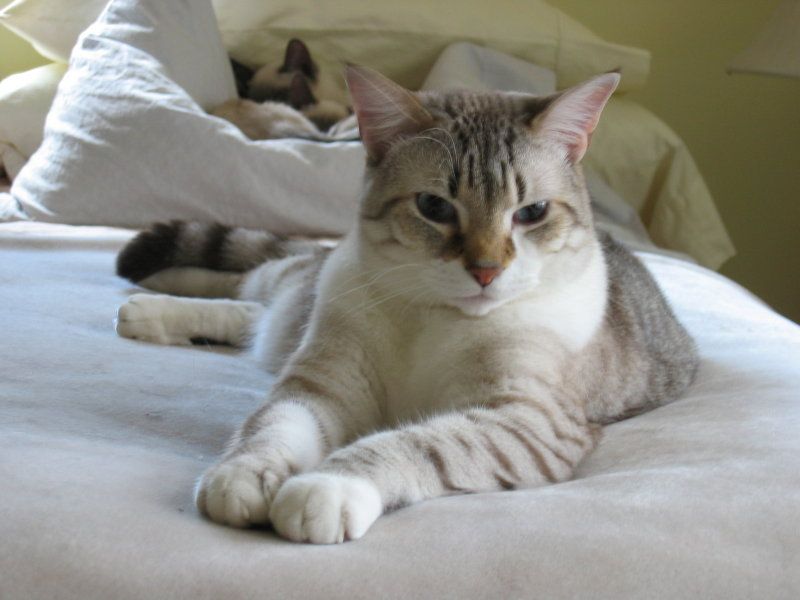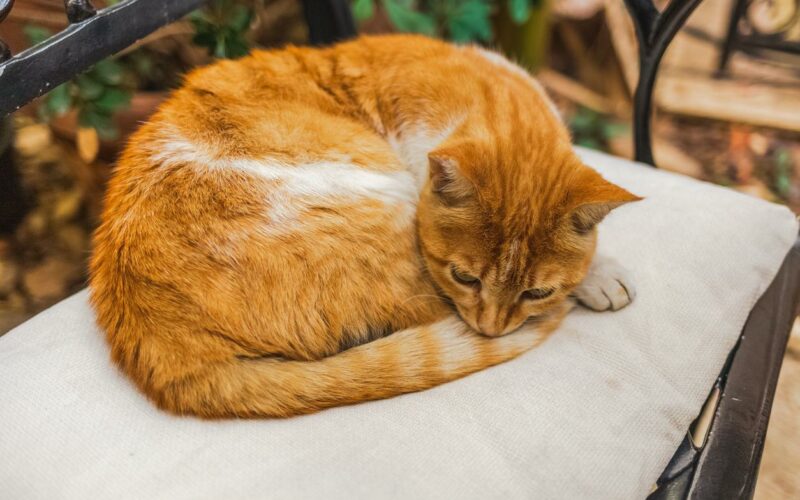The topic of if cats can have autism is probably one you haven’t heard about, and you may wonder if it’s possible that cats have autism or if you think there are some signs you’ve seen recently on your cat that gave you reasons to believe that your cat has autism. We will discuss that in this article, and at the end, you’ll get a few clarifications about cats and autism. We will begin with what autism is.
Autism Spectrum Disorder is a condition that impairs a person’s ability to communicate and interact with others. There are deficiencies in the ability to recognize and comprehend one’s emotions and those of others. Some autistic individuals frequently struggle with social contact and communication and repetitive or constrained habits or interests. People with autism can have extreme emotions, while others may have very little emotion. They may also learn, move, or pay attention in different ways. All of the signs of autism are most related to humans and recognized in them, and since a cat is an animal in this case, is it possible for cats to have autism?

When Humans relate to cats as their pets, there is a ground of communication that is developed between them. And it is from the model of this interaction that the cats’ personalities possibly get investigated for signs of autism in these feline creatures. However, no study has concluded that cats can have autism. Some cats exhibit more unusual or unsettling habits, such as anti-social tendencies toward people or hatred of being stroked. Cats can display some of these traits that are characteristic of autistic persons, but they do not develop autism in the same manner as people do.
Five Signs to Look Out for cats with autism
Poor Interaction with Others

Cats are not the most gregarious animals, but they occasionally like company. But what should you do if you see that your cats are suddenly withdrawing socially? Before making a definitive determination about whether your cat interacts poorly with people, there are numerous factors to take into consideration. According to mounting evidence, cats’ stress levels, illnesses, and undesired habits are all greatly influenced by their environment.
Some of them are what we might have mistakenly seen as autistic behavior in our feline companions. Cats have social relationships, most essential between a mother cat and her kitten. Cats with human socialization and those descended from an amiable parent breed are friendlier toward strangers and display fewer indicators of discomfort when approached and handled by strangers. Cats that interact with people maintain a consistent behavior toward them following socialization.
When Cats are socialized with people but come across unfamiliar people, they will make more direct eye contact than they do with familiar people, with most of the attention behaviors shown to both groups of people on the first day. Kittens that are not socialized to people approach people more slowly and interact with them less frequently. But when you learn that your cats don’t have any social relationships like this. It is best to notify your veterinarian and seek explanations and advice, especially if the problem is new.
Vocalization

There are numerous causes for your cats to start acting strangely vocally. Cats meow for various reasons, including seriousness, attention-seeking, and an attempt to communicate their desire to reproduce with their owner. You’ll hear a lot more noise if your cat isn’t spayed or neutered. When they require attention, they have a voice as well. In an effort to acquire a bite, some cats meow whenever someone enters the kitchen.
Meowing is solely a form of communication, whereas purring is a general expression of contentment or a care-seeking behavior. Although purring can occur in many different contexts, including in the clinic when the cat is in pain or is distressed, domestic cats are generally more vocal toward humans than feral cats and during cat-cat interactions. Therefore, it has been proposed that purring may act as a “manipulative” signal for contact and care solicitation, possibly derived from when the kitten asks the mother for care.
However, if it’s just a single cat and its owner, they might have developed the ability to communicate with one another. Your cat may exhibit autism if you notice that you no longer fully comprehend their language or if they start to become less vocal.
Unusual behavior

When your cats enter different seasons of the year brought on by climatic changes, they may exhibit strange behaviors. In the summer, cats with lengthier coats are more likely to feel the heat, so if your cat’s fur hasn’t yet been brushed, she can act strangely out of the discomfort. A male cat may start talking when he hears or smells a female cat in heat. Cats enjoy being with their pet owners. They require dedicated time each day for playing, grooming, and conversing. When the routine changes— probably because you became busier— your cat, who has become accustomed to having this much fun, it’s possibly they’ll act differently.
Intensity of focus
Sensory anomalies are common in autistic people, both in children and adults. Cats too may exhibit comparable features of intense focus or commitment to a specific routine or object. But once more, just because cats exhibit these behaviors doesn’t imply that a person is autistic. Additionally, some cats may show diminished sensory response, clumsy movements, or a lack of focus; these symptoms could indicate something is wrong.
Lights and motion intrigued
Autistic people or individuals diagnosed with autism spectrum disorder (ASD) are frequently and abnormally fascinated by lights. Cats also display these behaviors, leading some cat owners to speculate that their feline companions may be autistic. It is quite normal that cats get captivated by lights and movement, as anyone who has played with one knows who has used a laser pointer. It is possible that this is simply a characteristic of cats, and it has nothing to do with autism and everything to do with a cat’s natural propensity to chase anything that moves.
How to help cats with autism (5 Tips)

Tip #1 Help cats with autism
Engage your cat frequently. Schedule specific playtime each day while trying to follow a particular routine. Cats are domesticated animals that gain from routine, cordial, and predictable social interaction with people. Use eye-catching accessories such as an electronic mouse, chase-the-prey toys, and toys with attractive lights for a predetermined period of time.
Your cat may experience anomalies if you allow them to play nonstop because they may get overstimulated, fixated, or restless, so you may want to balance their playtime and rest time. Consistently treating the cat well from a young age results in good behaviors like decreased stress and fear and a solid human-cat interaction. Take note that many cats prefer having social interactions with people on a frequent, low-intensity basis because it provides them with a lot of control.
Cats can start, stop, and moderate their interactions with people in this situation. As we previously indicated, some of the symptoms you may mistakenly think are associated with autism in your cats may result from routine or environmental changes that the cat may have undergone. Additionally, it might have caused confusion on your end, leading you to believe that your cat has autism.
Tip #2 Help cats with autism
Male cats yowl when they detect a female in heat, and females yowl when they are in heat. Both can be aggravating, but having your pet spayed or neutered will stop this. Cats frequently meow to request play, attention or to speak to them. Stop responding when attention-seeking meows occur to reduce their frequency. Only pay them attention when they are silent.
If they start meowing once more, ignore them or turn aside. Don’t disregard your pet, though. Play, groom, and converse with them for extended periods of time each day. And many cats become very noisy when it’s almost time for their meals. Don’t feed your cat while they cry; wait until they are calm before doing so. While meowing and snarling from cats can be annoying, they may also be expressing discontent or discomfort. You shouldn’t disregard your cat’s screams, whether they merely need more attention or medical treatment. When your cat meows, investigate to learn what’s causing the sound.
Tip #3 Help cats with autism
Your cat may be acting up because they need to be groomed, which might explain everything. To assist them, You can bathe your cat and, if necessary, adjust the temperature to suit them better. But you shouldn’t leave them unattended during this period until you’re sure everything is back to normal.
Spaying or neutering your cat can avoid a wide range of health issues in addition to reducing the amount of meowing. However, it’s safe to think something is amiss if your cat is showing unusual behavior despite doing what you’ve always done as a solution that has worked in the past. Don’t ever ignore any strange behavior of your cat, and never punish them either, since this will make your cat fear you and overlook the actual cause of their actions.
Tip #4 Help cats with autism
When you observe your cat displaying a previously unseen level of exceptional interest in a particular object. It could simply be because it hasn’t had fun in a while. It’s possible that you haven’t been paying close attention to it. Consider scheduling playtime for your cat; during playtime, he needs to be overstimulated, so let him work out all of his energy till it calms him down the most.
You can establish a regular time for your cat to play, snuggle, or engage in social interaction. Treat-dispensing toys, prey toys, and other mentally stimulating cat toys are also acceptable. However, when your cat reaches their breaking point, you can feed him and put them to rest so he may calm themselves.
Tip #5 Help cats with autism
Work towards recognizing the triggers your cats are having. Try decreasing the lights if they are too bright. Try noise-canceling headphones or give them earphones so they can have what to focus on when they’re carried away by motion. Prepare a calm ambiance that you can take them to when you see they’re becoming carried away with a light or movement.
As stress and their surroundings have a significant impact on their behavior and emotions. They typically have a motive for things and don’t just “act out” for fun. After trying all this, when you notice strange behaviors that don’t help the case, a veterinarian’s help is ideal in handling this problem. They can establish whether your cat’s meowing is brought on by aging. They can also give her prescription drugs to treat her problems.
Final thoughts
Cats are intelligent, complex animals, with each species and breed having unique personalities. Cats and their pet parents tend to grow into understanding each other and find meeting grounds for communication as they spend time together. So it’s understandable that there would be concerns when they begin acting oddly in a way they do not recognize in their feline pets. It may cause them to worry and think maybe something is amiss with them.
Indeed, cats occasionally display behaviors consistent with those seen in autistic persons. However, that does not necessarily imply that your cat has a problem. Every cat is unique. As a result, it can be challenging to classify typical and uncommon behaviors for each cat. At least not in the same way humans can; cats cannot experience autism.
However, Calling the vet or getting a wellness checkup is always recommended if your cat behaves very strangely or you fear anything is wrong to ensure your pet’s mental and physical health is in good shape. Your cat’s behavior could have some hidden causes which your vet may be able to find.
Further Reading






